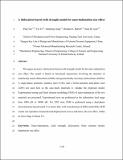| dc.contributor.author | Tao, Ping | |
| dc.contributor.author | Ye, Fei | |
| dc.contributor.author | Gong, Jianming | |
| dc.contributor.author | Barrett, Richard A. | |
| dc.contributor.author | Leen, Sean B. | |
| dc.date.accessioned | 2021-04-01T07:35:28Z | |
| dc.date.available | 2021-04-01T07:35:28Z | |
| dc.date.issued | 2021-02-20 | |
| dc.identifier.citation | Tao, Ping, Ye, Fei, Gong, Jianming, Barrett, Richard A., & Leen, Seán B. (2021). A dislocation-based yield strength model for nano-indentation size effect. Proceedings of the Institution of Mechanical Engineers, Part L: Journal of Materials: Design and Applications. doi:10.1177/1464420721992796 | en_IE |
| dc.identifier.issn | 2041-3076 | |
| dc.identifier.uri | http://hdl.handle.net/10379/16668 | |
| dc.description.abstract | This paper presents a dislocation-based yield strength model for the nano-indentation size effect. The model is based on functional expressions involving the densities of statistically stored dislocations and geometrically necessary dislocations. A single-phase austenitic stainless steel (316L) and a ferrite-austenite dual-phase steel (2205) are used here as the case-study materials to validate the proposed model. Experimental testing and finite element modelling of nano-indentation of the two materials are presented. Experimental tests are performed in the indentation load range from 1000 µN to 10000 µN. For 2205 steel, finite element modelling is performed using a dual-phase microstructure-based model. It is shown that, with consideration of statistically stored dislocations and geometrically necessary dislocations, finite element modelling results can reproduce measured load–displacement curves and hence, the size effect, within an error range of about 5%. | en_IE |
| dc.description.sponsorship | The work is supported by the Innovation Project for Postgraduate Research & Practice Innovation Program of Jiangsu Province (KYCX18_1093). We also gratefully acknowledge the support from China Scholarship Council (CSC) and National University of Ireland (NUI), Galway. This work has also been partly funded with the financial support of Science Foundation Ireland as part of the MECHANICS joint project between NUI Galway and University of Limerick under grant number of SFI/14/IA/2604 and the I-Form Advanced Manufacturing Research Centre under grant number SFI/16/RC/3872. | en_IE |
| dc.format | application/pdf | en_IE |
| dc.language.iso | en | en_IE |
| dc.publisher | SAGE Publications | en_IE |
| dc.relation.ispartof | Proc I Mech E, Part L, Journal of Materials: Design and Applications | en |
| dc.rights | Attribution-NonCommercial-NoDerivs 3.0 Ireland | |
| dc.rights.uri | https://creativecommons.org/licenses/by-nc-nd/3.0/ie/ | |
| dc.subject | Nano-indentation | en_IE |
| dc.subject | yield strength | en_IE |
| dc.subject | dislocation | en_IE |
| dc.subject | finite element model | en_IE |
| dc.subject | indentation size effect | en_IE |
| dc.title | A dislocation-based yield strength determination model in nano-indentation test | en_IE |
| dc.type | Article | en_IE |
| dc.date.updated | 2021-03-30T10:34:54Z | |
| dc.identifier.doi | 10.1177/1464420721992796 | |
| dc.local.publishedsource | https://doi.org/10.1177/1464420721992796 | en_IE |
| dc.description.peer-reviewed | peer-reviewed | |
| dc.contributor.funder | Science Foundation Ireland | en_IE |
| dc.contributor.funder | Innovation Project for Postgraduate Research & Practice Innovation Program of Jiangsu Province | en_IE |
| dc.contributor.funder | China Scholarship Council | en_IE |
| dc.internal.rssid | 25428362 | |
| dc.local.contact | Sean Leen, Mechanical & Biomedical Eng, Eng-2051, New Engineering Building, Nui Galway. 5955 Email: sean.leen@nuigalway.ie | |
| dc.local.copyrightchecked | Yes | |
| dc.local.version | ACCEPTED | |
| dcterms.project | info:eu-repo/grantAgreement/SFI/SFI Investigator Programme/14/IA/2604/IE/Multi-scale, Through-process Chracterisation for Innovative Manufacture of Next-generation Welded Connections (MECHANNICS)/ | en_IE |
| nui.item.downloads | 169 | |


